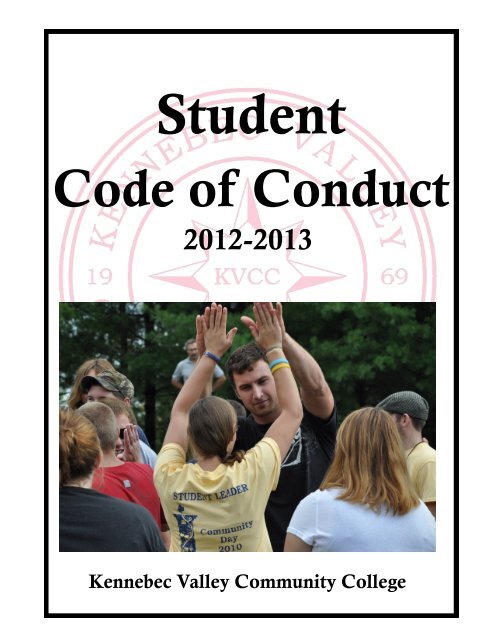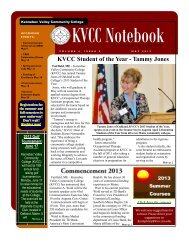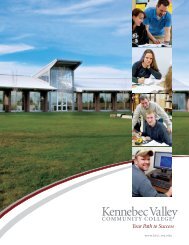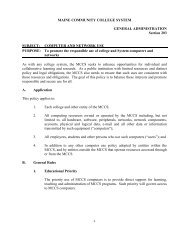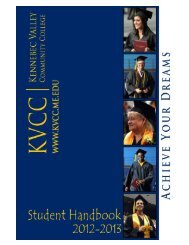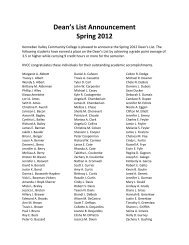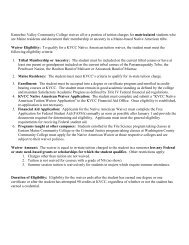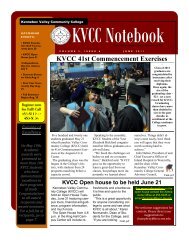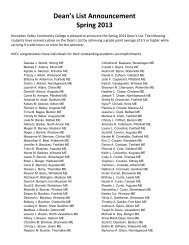Student Code of Conduct - Kennebec Valley Community College
Student Code of Conduct - Kennebec Valley Community College
Student Code of Conduct - Kennebec Valley Community College
Create successful ePaper yourself
Turn your PDF publications into a flip-book with our unique Google optimized e-Paper software.
<strong>Student</strong><strong>Code</strong> <strong>of</strong> <strong>Conduct</strong>2012-2013<strong>Kennebec</strong> <strong>Valley</strong> <strong>Community</strong> <strong>College</strong>
<strong>Student</strong> <strong>Code</strong> <strong>of</strong> <strong>Conduct</strong>The purpose <strong>of</strong> the <strong>Code</strong> <strong>of</strong> <strong>Conduct</strong> is to establish an atmosphere <strong>of</strong> mutual respect in thecollege community. It contains a set <strong>of</strong> principles and guidelines that define how students areexpected to interact with one another, and applies specifically to students and studentorganizations.I. Purpose <strong>of</strong> <strong>Code</strong>The <strong>College</strong> requires students to conduct their affairs with proper regard and mutual respectfor the <strong>College</strong> and the members <strong>of</strong> its community. In seeking to encourage responsibleconduct, the <strong>College</strong> will rely upon counseling and admonition. When necessary, the <strong>College</strong>will use this <strong>Code</strong> to: 1) ensure the orderly administration <strong>of</strong> the <strong>College</strong>'s academic, athletic,and social <strong>of</strong>ferings; 2) secure the opportunity <strong>of</strong> all students to pursue peacefully theireducational objectives; 3) protect the health, safety and welfare <strong>of</strong> the <strong>College</strong> and themembers <strong>of</strong> its community; and 4) maintain and protect the real and personal property <strong>of</strong> the<strong>College</strong> and the members <strong>of</strong> its community.This <strong>Code</strong> applies in addition to other <strong>College</strong> and System policies and regulations, localordinances, and state and federal laws. <strong>Student</strong>s whose conduct violates those authoritiesmay also be subject to their sanctions and penalties. Finally, the Residence Hall Agreementbetween a student and the <strong>College</strong> imposes similar but additional responsibilities andobligations, and students whose conduct violates both that Agreement and this <strong>Code</strong> may bedisciplined by the <strong>College</strong> under either or both.II. Persons Governed by <strong>Code</strong>This <strong>Code</strong> applies to persons who are students and to organizations that are studentorganizations at the time <strong>of</strong> the alleged conduct. <strong>Student</strong>s and student organizations are alsoresponsible for the conduct <strong>of</strong> their guests, and this <strong>Code</strong> may be invoked against studentsand student organizations whose guests violate the <strong>Code</strong>. When a student is alleged to haveviolated the <strong>Code</strong> at a <strong>College</strong> other than the <strong>College</strong> in which the student is enrolled, theviolation will be referred for disposition to the student's campus <strong>of</strong> enrollment.III. <strong>Conduct</strong> Governed by <strong>Code</strong>This <strong>Code</strong> applies to conduct, wherever it occurs, that: 1) involves the real property owned,occupied, or otherwise used by the <strong>College</strong>; 2) involves the personal property owned, occupiedor used by the <strong>College</strong> community; 3) involves a <strong>College</strong> or <strong>College</strong>-related activity, event, orfunction; 4) poses an imminent or substantial threat to persons or property in the <strong>College</strong>community; and/or 5) otherwise interferes with the objectives or adversely affects the interests<strong>of</strong> the <strong>College</strong> or members <strong>of</strong> its community. Examples <strong>of</strong> violations <strong>of</strong> this <strong>Code</strong> include, butare not limited to:
Fraudulent conduct, which includes, but is not limited to:1. Plagiarism;2. Cheating;3. Supplying or assisting to supply false information to <strong>College</strong> personnel;4. Violating a pr<strong>of</strong>essional code <strong>of</strong> conduct or ethics;5. Unauthorized representation <strong>of</strong> the <strong>College</strong> or its personnel;6. Failing to identify oneself to <strong>College</strong> personnel; and/or7. Tampering with or falsifying <strong>of</strong>ficial documents or records.<strong>Conduct</strong> that disregards the welfare, health or safety <strong>of</strong> the <strong>College</strong>community, which includes, but is not limited to:1. Assault, harassment or intimidation;2. False reports <strong>of</strong> fire or other dangerous conditions;3. Unauthorized use or possession <strong>of</strong> weapons, explosive components or chemicals,including fireworks, firearms, explosives, gas, or compressed air;4. Disturbing authorized activities or the peaceful operation <strong>of</strong> the <strong>College</strong>;5. Use, possession, sale or distribution <strong>of</strong> alcoholic beverages or drugs as prohibited bylaw or <strong>College</strong> policy;6. Being under the influence or knowingly in the presence <strong>of</strong> drugs or alcohol while on<strong>College</strong> property or at <strong>College</strong> related events;7. Action prohibited by health or safety regulations;8. Creation <strong>of</strong> a fire hazard or other dangerous condition;9. Restriction <strong>of</strong> vehicular or pedestrian traffic flow into or out <strong>of</strong> <strong>College</strong> property orfacilities;10. Action that produces mental or physical discomfort, embarrassment, harassment, orridicule to any member <strong>of</strong> the <strong>College</strong> community;11. Intentionally placing a person or persons in reasonable fear <strong>of</strong> physical harm;12. Lewd or indecent behavior;13. Tampering with fire or safety equipment;14. Parking violations;15. Disobeying the lawful order <strong>of</strong> <strong>College</strong> personnel; and/or16. Any other conduct that threatens or endangers the health or safety <strong>of</strong> any person inthe <strong>College</strong> community.Improper use <strong>of</strong> property, which includes but is not limited to:1. Misuse, destruction, defacement or unauthorized requisition, removal or use <strong>of</strong><strong>College</strong> or <strong>College</strong> community property;2. Unauthorized presence on <strong>College</strong> property; and/or3. Violation <strong>of</strong> <strong>College</strong> or System computer use policies.Other conduct that interferes with the orderly business <strong>of</strong> the <strong>College</strong>, whichincludes, but is not limited to:1. Failure to comply with a sanction imposed by the <strong>College</strong>;2. Interference or refusal to cooperate with an inquiry under the <strong>Code</strong>;
B. Disciplinary CommitteeThe Disciplinary Committee (“Committee”) shall consist <strong>of</strong> at least three and not morethan five members, each appointed by the President. At least one member shall be afaculty member and one member may be a student. The President shall appoint aChair.1. AppealThe student may appeal to the Committee the findings or decisions <strong>of</strong> anInvestigator. A written appeal must be submitted to the Dean within two (2) schooldays following the day when the student receives the Investigator’s written decision,and must state specifically the grounds for appeal. A student who fails to file aproper and timely appeal may be deemed to have waived the right to appeal. ThePresident may grant a request by a person materially affected by the alleged <strong>Code</strong>violation to have the Disciplinary Committee review a decision <strong>of</strong> the DisciplinaryOfficer to dismiss a case or to impose a relatively low sanction.2. HearingAfter receiving the student's appeal, the Committee Chair shall notify the student,Dean, and/or Officer <strong>of</strong> the time and location for the hearing. A hearing shall be heldas soon as practical and shall proceed as follows: The Committee Chair shallpreside; the Dean and/or Officer will present the charges, information and findingsagainst the student; the student will respond to the case presented by the Deanand/or Officer; and the Dean and/or Officer and student may then each summarizeorally their position.All or a portion <strong>of</strong> the hearing may, in the discretion <strong>of</strong> the Committee, be closed topersons other than those recognized by the Chair. If a student does not attend thehearing, the Committee may commence the hearing or continue the hearing to alater time or date. The student may be assisted by a person during the hearing andattendant proceedings and that person may advise, but not speak on behalf <strong>of</strong>, thestudent. Only the members <strong>of</strong> the Committee may pose questions to the witnessesor parties. The Committee is not bound by court rules <strong>of</strong> evidence or procedure.3. DecisionThe Committee will convene in closed session to find facts and determine any <strong>Code</strong>violation (s). The Committee may consider any relevant and reliable information indetermining whether it is more probable than not that the alleged conduct occurred,and that such conduct violated the <strong>Code</strong>. The Committee is not bound by theInvestigator’s findings and sanctions. The Committee may impose any appropriatesanction up to and including dismissal. Disciplinary sanctions imposed by theCommittee take effect immediately unless otherwise specified. A majority vote <strong>of</strong>Committee members present and voting will prevail. After the hearing, theCommittee shall notify the student in writing <strong>of</strong> the facts found to be true; the <strong>Code</strong>section (s) violated; the disciplinary sanction; and the student's limited opportunityto appeal to the <strong>College</strong> President.
C. <strong>College</strong> PresidentA student may appeal to the President only a Committee sanction <strong>of</strong> suspension or dismissalfrom the <strong>College</strong>. Such appeal must be submitted in writing to the President withintwo (2) school days following the day when the student receives the Committee's writtendecision, and must state specifically the grounds for appeal. Such appeals shall be limitedto the Committee's procedures and the appropriateness <strong>of</strong> the sanction. A student wh<strong>of</strong>ails to file a proper and timely appeal may be deemed to have waived the right to appeal.The President may also grant a request by a person materially affected by the alleged<strong>Code</strong> violation to review a decision <strong>of</strong> the Disciplinary Committee to dismiss a case or toimpose a relatively low sanction. In all cases, the President shall issue a written decisionas soon as practical after the hearing. The President is not bound by the decisions <strong>of</strong> eitherthe Investigator or Committee.VI. Notice and Receipt <strong>of</strong> NoticeA <strong>College</strong> may provide a notice under this <strong>Code</strong> to a student either in person or to the student’smost recent electronic, campus or U.S. mail address on file at the <strong>College</strong>. A studentwill be deemed to have received such notice immediately when informed in person;within 24 hours when notified by electronic or campus mail; and within 72 hours <strong>of</strong> thedate <strong>of</strong> mailing when notified by U.S. mail. In all instances a student has an affirmative dutyto remain in contact with the <strong>College</strong> while a matter is pending under this <strong>Code</strong>.VII. DefinitionsThe following terms have the following meanings when used in this <strong>Student</strong> <strong>Code</strong> <strong>of</strong> <strong>Conduct</strong>,unless the context indicates otherwise:"<strong>Code</strong>" means this <strong>Student</strong> <strong>Code</strong> <strong>of</strong> <strong>Conduct</strong>;"<strong>College</strong>" means a college <strong>of</strong> the Maine <strong>Community</strong> <strong>College</strong> System;"<strong>College</strong> Activity" means an activity under the auspices <strong>of</strong> the <strong>College</strong>, including activities<strong>of</strong> students and student organizations;"<strong>College</strong> <strong>Community</strong>" means any person or organization that attends, performs servicesfor, is employed by, visits, or otherwise uses the <strong>College</strong>;"<strong>College</strong> Personnel" means any instructor, administrator, employee, committee, or contractor<strong>of</strong> the <strong>College</strong> or System;"Course" means any class <strong>of</strong> instruction, regardless <strong>of</strong> credit, <strong>of</strong>fered by the <strong>College</strong>;"President" means the <strong>College</strong> President or the President's designee;"Property" means the real and personal property controlled through ownership, rental,charter or other means by the System, <strong>College</strong>, State <strong>of</strong> Maine, or a member <strong>of</strong> the <strong>College</strong><strong>Community</strong>."Property" includes written documents and computer programs, files, and resources;"School Day" means a day that the <strong>College</strong> is open for instruction;"<strong>Student</strong>" means a person enrolled in a course <strong>of</strong> the <strong>College</strong> and includes, unless otherwisenoted, student organizations;"<strong>Student</strong> Organization" means an organization that acts or purports to act for a student inmatters regarding the <strong>College</strong>;"System" means the Maine <strong>Community</strong> <strong>College</strong> System.
VIII. Additional Procedures for Sexual OffensesIn addition to the provisions <strong>of</strong> this <strong>Code</strong>, a <strong>College</strong> shall also apply the provisions <strong>of</strong> theMCCS Clery Act Sexual Offense procedure when the alleged misconduct involves a sexual<strong>of</strong>fense.IX. Coordination <strong>of</strong> this <strong>Code</strong> with the MCCS Policy on Special Conditions <strong>of</strong>ParticipationThis <strong>Code</strong> shall be used in conjunction with the MCCS policy on Special Conditions <strong>of</strong>Admissions, Enrollment and Participation as follows. When the student’s underlying personalconduct at issue is subject to the jurisdiction <strong>of</strong> the MCCS <strong>Student</strong> <strong>Code</strong> <strong>of</strong> <strong>Conduct</strong>(for example, the underlying misconduct at issue occurs on college property or is relatedto a college event, and is also subject to criminal prosecution), the procedures <strong>of</strong> this<strong>Code</strong> and the substantive guidance <strong>of</strong> that policy shall be used. When the underlying conductis not subject to this <strong>Code</strong> (for example, the underlying misconduct at issue does notoccur on college property or in relation to a college event but is still subject to criminalprosecution), the procedures and substantive guidance <strong>of</strong> that policy shall be used.X. Certain Athletic DeterminationsThe provisions <strong>of</strong> this <strong>Code</strong> apply to misconduct related to participation in athletics. Theprocedures <strong>of</strong> this <strong>Code</strong> do not, however, apply determinations <strong>of</strong> whether a student may bea member <strong>of</strong>, or receive playing time for, a college athletic team because the student hasengaged in conduct detrimental to the team. Those determinations shall be made by thecoach, provided that the affected student may appeal the coach’s decision to the <strong>College</strong>Dean <strong>of</strong> <strong>Student</strong>s. For purposes <strong>of</strong> this provision, “conduct detrimental to the team” includes,but is not limited to, conduct that is unsportsmanlike to fans, <strong>of</strong>ficials or opposingcoaches or players; disruptive to practices and other team events; brings disruption or disreputeto the team through misconduct or violations <strong>of</strong> law, <strong>College</strong> or System policy; or is otherwisecontrary to the principles taught through athletic competition, such as reliability, diligence,commitment, teamwork and the willingness to take seriously the duty to representthe <strong>College</strong> honorably during competition. Each <strong>College</strong> may adopt a more specific definition<strong>of</strong> “conduct detrimental to the team” that furthers the educational purposes <strong>of</strong> athleticcompetition.XI. Traffic ViolationsA student violation <strong>of</strong> a rule governing a moving, parked or standing vehicle on propertyowned, operated or under the control the MCCS shall be processed under this <strong>Code</strong> only ifthe sanction sought by a college is suspension or expulsion from college for that violation. Inall other cases, a college shall provide a process that permits a student an informal opportunityto contest the alleged violation before a person designated by the college to hearsuch contests.Karen Normandin, Dean <strong>of</strong> <strong>Student</strong>s453-5019, Fryeknormandin@kvcc.me.edu


